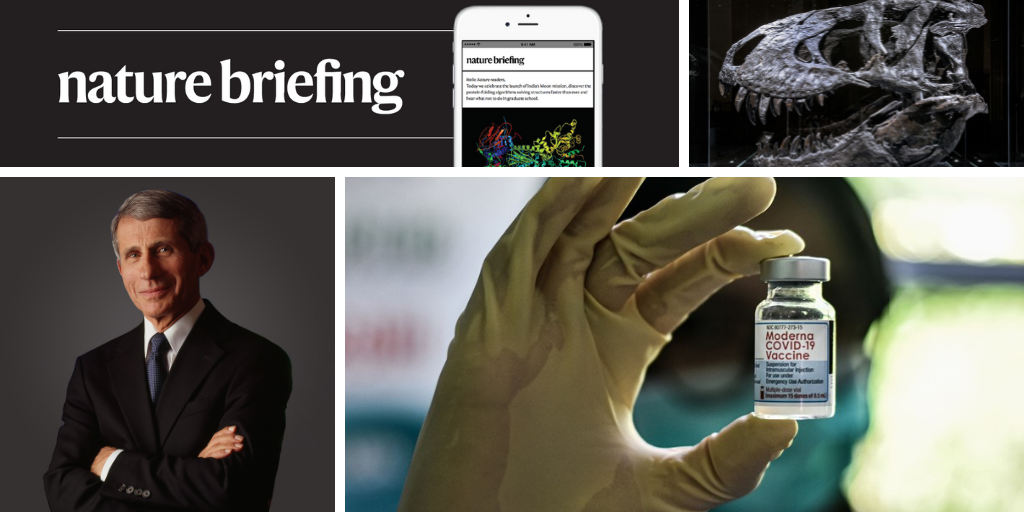NATURE BRIEFING 01 December 2021 Sign up for Nature Briefing
Hello Nature readers, would you like to get this Briefing in your inbox free every day? Sign up here. Moderna’s COVID-19 vaccine is at the centre of a patent dispute that could potentially affect future public–private collaborations.Credit: Moch Farabi Wardana/Pacific Press/LightRocket/Getty
Geoengineering research should be globalSolar geoengineering by injecting aerosol sulfates into Earth’s stratosphere is the fastest known technique for cooling the planet and is so comparatively inexpensive that it is vital to improve our murky understanding of its consequences, says climate scientist Kate Ricke. Global research—not just by elite groups in North America and Europe—is crucial to build trust in the science before some entity is tempted to use the technique. ‘It’s actually important that the ministry of the environment in Bangladesh has someone who’s Bangladeshi talking to them about geoengineering science,’ says Ricke.Wired | 10 min readOmicron was already spreading in EuropeOmicron, the new coronavirus variant labelled as being ‘of concern’ by the World Health Organization, was present in the Netherlands before the first cases were identified in southern Africa. The Dutch health authority RIVM has reported cases dating back to 19 November, although it is not known if those people were infected outside the country. South African scientists have said they feel that they’re being punished for their advanced genomic-surveillance programme, which detected the variant and enabled other nations to respond quickly, but has resulted in travel bans that have largely target southern African nations.CBS | 5 min readBlack holes on a collision courseA newly discovered pair of supermassive black holes is closer to Earth than any known so far. The two are only 1,600 light years apart, so astronomers predict they will smash together in a mere 250 million years. One sits at the centre of the galaxy NGC 7727, with the other just off to the side. Many more off-centre black holes could be hiding throughout the Universe, say astronomers — in which case, the cosmos might contain up to 30% more of the celestial objects than previously thought.New Scientist | 3 min readReference: Astronomy & Astrophysics paperFeatures & opinionFauci on 40 years of progress against AIDSOn World AIDS Day, US public-health leader Anthony Fauci reflects on four decades of studying HIV, and what lessons can be drawn for the COVID-19 pandemic. The fight against HIV reveals the importance of using available treatments and strategies for prevention, while searching for better ones, and considering equity, education and outreach, he says. ‘There are many similarities that sadden me,’ writes Fauci. ‘How hard some patient groups need to fight for recognition; how misinformation and denialism can promote illness and death; how slowly interventions reach vulnerable populations; how easy it can be to overlook patient inputs when setting research priorities.’Nature | 5 min readOmicron co-discoverer on COVID and HIVAfrican nations need to tackle HIV and COVID-19 together to minimize the risk to human life and limit the emergence of coronavirus variants, argue four South African scientists, including Tulio de Oliveira, the co-discoverer of the Omicron variant. Failure to get COVID-19 vaccines to nations with high rates of uncontrolled advanced HIV puts people living with that virus ateven greater risk, and could drive the emergence ofcoronavirus variants. De Oliveira and his co-authors argue that world leaders need to commit to vaccine equity between countries, and devote more of their resources and attention to the interactions between COVID-19 and HIV, to combat both diseases more effectively.Nature | 10 min readImage of the week The Tyrannosaurus rex dubbed ‘Tristan Otto’ had an infection in its jaw — probably the bone disease tumefactive osteomyelitis, say scientists. Researchers used a computed tomography (CT) scanner and an X-ray technique called dual-energy CT to demonstrate that the fossil — one of only two original T. rex skeletons in Europe — could be analysed without damaging it. (Cosmos | 4 min read)RSNA and Charlie Hamm, M.D.
Jaime Castro-Mondragon, Rafael Riudavets-Puig and Ieva Rauluseviciute share joint first-author credit in a recent paper. (Nucleic Acids Research | 1 min read, or 24 min if you want to learn all about JASPAR, the open-access database of transcription factor binding profiles) doi: https://doi.org/10.1038/d41586-021-03610-3We have had tough COVID times round my house this week, made slightly better by the news that Canada is releasing 22.7 million kilograms of maple syrup from its strategic reserve. I’ll be consuming at least a few barrels; good to know that there will be enough for everyone.Make my day even sweeter by telling me what you think of this newsletter. Please send your feedback — whether positive or critical — to briefing@nature.com.Flora Graham, senior editor, Nature BriefingWith contributions by Smriti Mallapaty, Anne Marie Conlon and Anna Nowogrodzki.
https://www.nature.com/articles/d41586-021-03610-3
